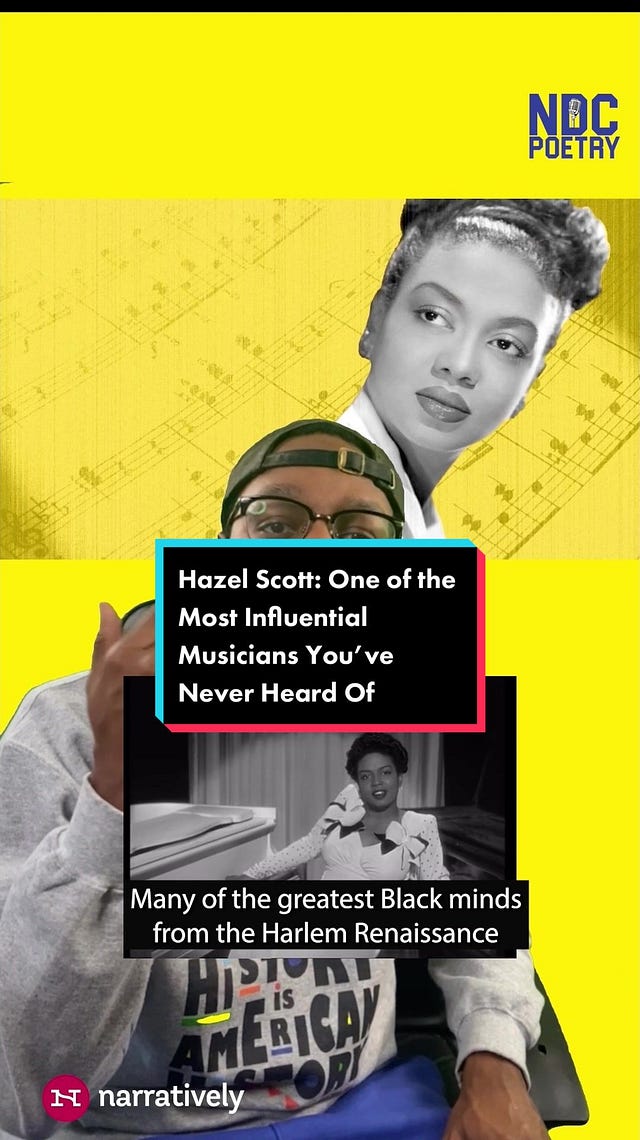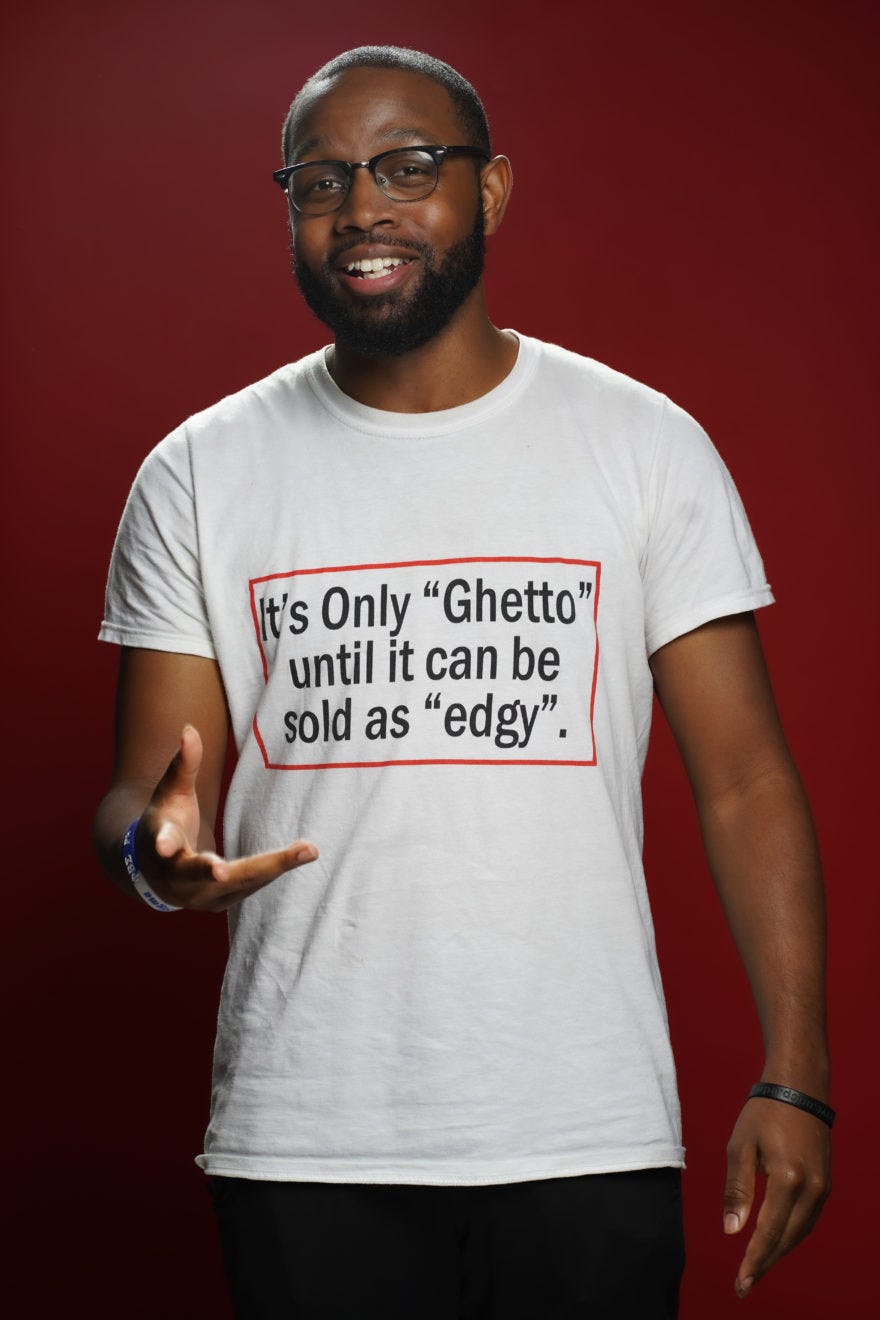The TikTok Poet Bringing Untold Black History to the Masses
Nick Courmon is sharing forgotten Black history in a very modern way.
As a spoken word poet and student of African American history, the last thing Nick Courmon expected was to become a TikTok influencer. But his videos about little-known moments in history, delivered in powerful rhymes, have resonated with millions of viewers—like in this collaboration with Narratively, in which he shared the story of the legendary but often overlooked Black jazz musician, Hazel Scott, based on our piece about her.
We’re thrilled to have Nick teaching the upcoming Narratively Academy seminar, A Pen for the People: Using Writing as a Tool for Action. In this inspiring 90-minute writing workshop, students will explore methods for how to use their own writing to reflect the times and take action.
Nick sat down with Narratively to talk about history, spoken word poetry and the big dreams he has for combining these two fields to educate and entertain.
How did you get started as a spoken word poet?
I hated poetry as a kid. Then my grandfather passed away when I was in 6th grade, and my older brother performed a poem about him at the funeral service. I saw the way he was able to tell stories through the poem, and how people were remembering, smiling and laughing. Seeing that made me say to myself “I’m gonna do this.” From that day on I started writing poetry.
What drew you to history?
In my house, history was always big. We have a family library – these two humongous bookshelves. My dad had this series called the Black Achievement Series with notable African-Americans throughout history, from MLK to Josephine Baker. Black folks that spanned all kinds of different professions. After I stopped reading kids’ books, I read the Black Achievement Series. When you’re at home, it’s critical to lay that foundation so that when you’re at school, you can call out teachers for omitting history.
When I was in 3rd grade, we didn’t have any Black history books in our classroom, so I stuffed 5 or 6 of the Black Achievement books in my bookbag and I put them in the class library. I thought, “If I have it, everybody else should have it too.” That same concept goes into why I started making TikToks.
How do you usually find your stories? What drives you to tell them?
I’ve learned about a lot of them in grad school, but I also learned a lot from my family members – things I was never taught in school. I also go out and find information about somebody who is not well-known. Telling these stories and amplifying these voices is crucial if we’re going to know real history and have people be empowered by history. [Black people] have a long lineage of trailblazers. When you know where you come from you won’t accept anybody’s nonsense because you know who you are and the people who laid the groundwork for you.
I saw some of your spoken word poetry performances, which are amazing! How is writing and performing poems for a live audience different than writing for TikTok, and which do you prefer?
I would take a live performance any day. Being in person and feeling the energy that the crowd is giving you and you’re giving them—it’s almost like a tennis match of energy. People will sometimes pull me aside and tell me what resonated with them, or tell me they felt like I was speaking on their behalf. It speaks to how connected we are as people in general. I think sometimes we forget that we’re all human. We can never underestimate that human element.
What do you think writers in other mediums can learn from spoken word artists, poets and activists?
How to write unapologetically and from their gut. Poetry and activism both require honesty, authenticity, and a level of genuine interaction that can only come from operating in your complete truth. I also believe writers in other mediums can learn the power of perspective. Not only in defining their own but in learning to write from an alternative point of view where great empathy and a widened scope are required.
Who are your poetic influences?
When I started out my biggest influence was Tupac. The Rose That Grew From Concrete was the first poetry book that I owned. Others are: J. Cole, Nas, Kendrick Lamar, Black Thought, Langston Hughes, Maya Angelou, Audre Lorde, Nikki Giovanni, Amiri Baraka, Sonia Sanchez, Gwendolyn Brooks, El'Ja Bowens...I definitely have a lot of influences.
What advice do you have for young Black historians?
My advice would be: Just tell the story. Give it like it is. Give trigger warnings when necessary, but don’t sugarcoat the truth. Because these folks in the past, when they were committing atrocities or human rights violations, they weren’t sugarcoating their actions or words. When we try to coddle people for comfort we’re doing our ancestors a disservice.
Also, when you’re digging into these histories and telling these stories, be good with your own mental health. Please don’t just focus on the negative, because this is something that you can see yourself in, and you don’t want to just see trauma, murder, sexual assault. That is a part of the history, but that is not the history. Don’t be afraid to tell the story, know whose story you’re telling, and be proud of and intentional with the stories you’re telling.
What are you working towards?
Originally, my goal was to be a professor. But although I love education, I don’t like the institution of academia. You gotta deal with politics and gatekeepers. Now, I’m more focused on doing poetry and spoken word, and using it as a vehicle for all kinds of different avenues. Spoken-word-based education curriculum. Spoken-words TV specials. There’s so much that I want to do with poetry and spoken word. Of course, I want to use it for healing purposes. But the big picture is poetry.
What would you say to someone who wants to start writing about social justice issues but isn't sure how to find the right words?
Just write. Whether it be through journaling, poetry, bullet points, etc… The important part is to write. Whatever raw emotions you're feeling, write those. Whatever thoughts you are having, write those. Whatever questions you may have, write those. The "right" words will eventually come to you but I it is crucial to just write and you can worry about word choice in the editing process.
Join Nick for A Pen for the People: Using Writing as a Tool for Action.
You can watch Nick’s TikTok on Hazel Scott—based on our story about her—here.
Julianna Bjorksten is a Narratively contributing editor.
This interview has been edited and condensed for clarity.






